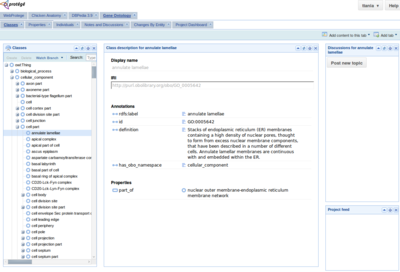WebProtege
WebProtégé
WebProtégé is a free, open source collaborative ontology development environment for the Web.
We encourage end users to use our hosted solution at: http://webprotege.stanford.edu. Alternatively, WebProtégé can be downloaded and installed on your own server.
WebProtégé provides the following features:
- Support for editing OWL 2 ontologies
- A default simple editing interface, which provides access to commonly used OWL constructs
- Full change tracking and revision history
- Collaboration tools such as, sharing and permissions, threaded notes and discussions, watches and email notifications
- Customizable user interface
- Customizable Web forms for application/domain specific editing
- Support for editing OBO ontologies
- Multiple formats for upload and download of ontologies (supported formats: RDF/XML, Turtle, OWL/XML, OBO, and others)
Source code
Latest release and release notes
Use WebProtégé now on our Stanford-hosted server! http://webprotege.stanford.edu
Documentation
User's Guide
A short user guide with screencasts and screenshots describing the main user interface elements in WebProtégé.
Download and Install - Administrator's Guide
A step-by-step guide for site administrators who want to download and install WebProtégé.
Developer's Guide
A guide for developers who want to compile and run WebProtégé from an IDE.
About WebProtégé
WebProtégé is being actively developed by the Protégé team at the Stanford Center for Biomedical Informatics Research. WebProtégé is free and open source under [https://github.com/protegeproject/webprotege/blob/master/license.txt BSD 2-clause} license.
References
- A WebProtégé paper describing its architecture, features and use in real-world cases is published in the Semantic Web Journal, and is available here.
- Several papers describing the use of WebProtégé in real use cases can be found here.
How to cite WebProtégé
Tudorache, Tania, Csongor Nyulas, Natalya F. Noy, and Mark A. Musen. "WebProtégé: A collaborative ontology editor and knowledge acquisition tool for the web." Semantic web 4, no. 1 (2013): 89-99.
Online version available here.
Contact Us
If you have questions or comments, please post them on the Protégé mailing lists.
